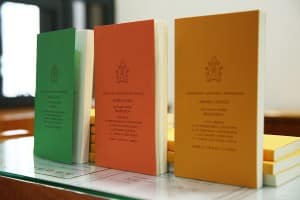May 17, 2016

This is my first-ever blog post. I’m honored to tap out a few lines about Pope Francis’ recent document, an “apostolic exhortation” in which he summarizes Church teaching and reflects on Christian marriage, family life, and pastoral care.
With the exceptions of (theologian) Pope Benedict XVI and (philosopher) St./Pope John Paul II, most papal documents are not written personally by a given pope. Even Popes Benedict XVI and John Paul II did not pen every line that ever appeared over their signatures. Like a president or other head of state, the Vicar of Christ does not spend the bulk of his time writing tomes for scholars to digest. So, when we say that “Pope Francis wrote” this document we mean that, as the Church’s chief teacher, his staff of selected scholars culled the documents related to the two recent Vatican Synods about marriage and family life, as well as other pertinent sources, and have crafted a synthetic teaching document, a handbook of sorts. It reflects the Church’s beliefs, all with the particular “spin” or “flavor” this present Pope himself wants to impart.
First and foremost, one notices that “Amoris Laetitia” (or, in English, “The Joy of Love”) is more about pastoral care than it is about doctrine or canon law. This includes Francis’ use of the more personal or pastoral “I” format, rather than the more ponderous papal “We.” Nowhere does Pope Francis dissent from or negate the Church’s rich theological tradition about the sacrament of marriage and its two-in-one-flesh indissolubility. However, again and again he points out that Church doctrine and teaching, while the ideal, ought not be the sole or last measure of our ongoing teaching and pastoral care. He calls for fidelity to the tradition, while at the same time finding room to appreciate complexity in married life, stressing that persons-of-good-will can and do fall short of the ideal. Voila, the God-given need for pastoral care at times to trump theology and church law:
“In this matter of reaching out to everyone, of needing to help each person find his or her proper way of participating in the ecclesial community and thus being touched by an ‘unmerited, unconditional and gratuitous’ mercy. No one can be condemned forever, because that is not the logic of the Gospel! Here I am not speaking only of the divorced and remarried, but of everyone, in whatever situation they find themselves.” (AL # 297)
In this spirit, the whole 261 page document reflects the oft-quoted comments about the Catholic Church at our best: “Here comes everybody!” and “A Big Church with a Big God.” It incarnates well the spirit of mercy and compassion for saints and sinners alike, which has been the hallmark of Francis’ style and papacy.
“The Joy of Love” serves as a primer about the Catholic approach to sacramental marriage and healthy family life, as well as offering pastoral advice for those in “irregular situations.” It is comprised of an introduction and nine short chapters. On first reading one can see that it is obviously a scissors & paste document, an attempt to sew into whole cloth (1) the scriptures, (2) writings of previous popes, (3) Vatican and Bishops’ Conference documents, (4) the two relatio summaries from the two halves of the Synod on the Family, (5) along with a smattering of quotations from scholars as diverse as Joseph Piepers, Martin Luther King, Erich Fromm, and several Latin American poets.
A look at the chapters:
A poetic chapter on
- the ecstasy and the agony of married love is followed by chapters on
- the experiences and challenges of family life today and
- looking to Jesus and the scriptures for a roadmap for healthy marriage and family living. There follows a chapter, likely lifted whole-cloth from another source, which
- dissects all the virtues and verbs in 1st Corinthian’s 13, Paul’s famous poetic reflection on the kind of Love which lasts and can never fail. One could easily lift and use it as a distinct spiritual reflection on its own. Francis reflects on
- “Love Made Fruitful” (i.e. procreation and other fruitfulness beyond),
- perspectives on better marriage preparation and programs across one’s married lifespan, and
- educational opportunities for inspiring and educating children in a family perspective. Only 21 pages, chapter
- focus on the controversial cases and pastoral issues so highlighted in the news following both segments of the synod. It’s entitled, “Accompanying, Discerning, and Integrating Weakness.” “The Joy of Love” closes with
- an all-too-brief attempt to craft a spirituality of marriage and family. In a sense it might as well have ended there with a note “to be continued.”
Realizing that blog entries are not treatises, I would like to close with some thoughts about Chapter 8, Pope Francis’ reflections “pastoral care,” an approach so simpatico with the Paulist spirit. As I read it I couldn’t help be reminded of the groundbreaking work of the late Paulist Fr. Jim Young and former Paulist Chris Witt in ministering to separated and divorced Catholics in the U.S. and Canada as far back as the 1970s and 1980s. Citing copiously from the final Relatio of the 2015 Synod:
“‘the Church must accompany with attention and care the weakest of herchildren, who show signs of a wounded and troubled love, by restoring in them hope and confidence, like the beacon of a lighthouse in a port ora torch carried among the people to enlighten those who have lost theirway or who are in the midst of a storm.’* Let us not forget that the Church’s task is often like that of a field hospital.” (AE #291, *Relatio Finalis #28)
The idea of using “the pastoral solution,” or what is spoken of more technically as “the internal forum,” is nothing new or terribly shocking to many (most) Catholic priests in the United States. Under the mentorship of cardinals like Bernardin, Deardon, May, Mahony, and other bishops, the post-Vatican II church of the U.S. has long been seeking to uphold the marital ideal, while dealing pastorally, situationally and compassionately with those who, for various reasons and levels of culpability, do not live the ideal.
As Pope Francis notes several times in “The Joy of Love,” this seems all the more timely and pertinent in this designated Year of Mercy. He does not give specific pastoral advice or case specifics. Rather, appreciating the complexity and depth of each marital situation, he encourages pastors, priests, and counselors to assist married couples to discern not only the ideal or the goal, but also the practical or ‘gradual’ steps they might apply in growing, moving, and striving in that direction. While not mentioning access to sacraments with any specificity, he does leave open the door to greater pastoral discernment than a traditional strict application of laws to cases.
Finally, just a couple random thoughts:
1. I was disappointed that Pope Francis opted to retreat from the earlier Relatio that spoke more pastorally and positively about some of the virtues of LGBT people and their commitments, which then went on to note that such relationships, whatever their merit, cannot and ought not be equated with the sacrament of marriage. It seems, as a compromise with conservative hierarchs and those parts of the world less open to LGBT people in general, the Pope saved the second half of the above thought, while dropping the first half or positive preface. In the end it comes off far harsher and less ‘pastoral’ toward LGBT people and their issues with the preliminary clause omitted. I’m not sure the real Pope Francis would concur with this harsher tone.
2. The document relies heavily on the Catholic emphases on marriage as natural, ordained by God, oriented toward mutual love (i.e. unitive) and fruitfulness (i.e. procreation). While these are valid starting points, the author seems to have done too little homework in the concepts of gender studies, orientation, masculinity and femininity as they might relate to and impact modern marriage. Thus, its use of “complementarity” makes “The Joy of Love” feel a bit stunted, stilted, or behind the curve of modern scholarship. Obviously not everything can be covered in every document, but it feels a bit weak on what modern insights into gender and culture might bring to a healthy 21st century discussion of marriage and family life.
3. In the end, for a consensus document, culled from such a variety of consistent and diverse sources, I think it is an amazingly positive and pastoral achievement. While Pope Francis insists that no church teaching about marriage, family, or sexuality needs to be changed in order to foster such a pastoral approach, I for one think that profession stretches credibility somewhat. If we allow for exceptions and pastoral applications to vary from the prescribed norm or “right way,” we are indeed changing our teaching, or at least acknowledging (finally) the shift from the traditional deductive, top-down, almost exceptionless model to one that is more inductive, from-the-ground-up, open to human experience, and accepting of complexity, the grey amidst what Catholics once thought was clear black and white only. How far we have come from the Thomistic, but limited notions of “invincible ignorance” and “sincerely erroneous conscience.” I can only imagine Bernard Haring, Josef Fuchs, Richard McCormick, Jim Young, and Servant of God Isaac Hecker resting easier in their graves.
Paulist Fr. Dick Sparks is based at St. Austin Church in Austin, TX. He holds a Ph.D. in moral theology.
